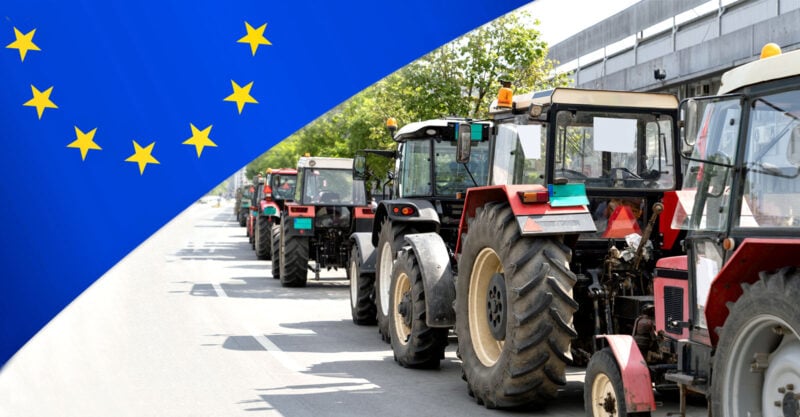Miss a day, miss a lot. Subscribe to The Defender's Top News of the Day. It's free.
Following the protests in Brussels last week by farmers from across the European Union (EU), the European Commission offered some concessions to the agricultural sector — but said it will not scale back its plan to cut 90% of greenhouse gas emissions by 2040, Reuters reported Tuesday.
The new commission plan drops the requirement to reduce farm-related emissions such as nitrogen, nitrous oxide and methane by one-third and removes the recommendation that EU citizens eat less meat, The Telegraph reported.
Commission President Ursula von der Leyen on Tuesday also offered to drop her proposal requiring farmers to cut pesticide use in half by 2030, saying it had become “a symbol of polarisation,” according to The Guardian.
Other concessions included limiting Ukrainian agricultural imports and delaying rules for setting aside more land to promote soil health and biodiversity.
At the behest of von der Leyen’s center-right European People’s Party, the revised commission plan features language praising the value of the agricultural sector, noting its importance for attaining the EU goal of food sovereignty, wrote Politico.
The compromise comes after weeks of escalating demonstrations by farmers in France, Spain, Germany, Portugal, Italy, Poland, the Netherlands, Belgium, Lithuania and other EU countries against several policies — from fuel subsidies and unfair trade practices to green emissions rules and taxes — that they said threaten their livelihoods.
The farmers argued the climate regulations have singled them out unfairly, imposing a disproportionate burden compared to other industries that also damage the environment, according to the Washington Examiner.
Over the past several weeks, tractors in several European cities blocked major highways and city streets — even an airport — forcing national governments to the negotiating table before the EU Parliament summit in Brussels last week.
German Chancellor Olaf Scholz’s coalition last month agreed not to eliminate a tax rebate on new agricultural vehicles, and to more gradually phase out subsidies on agricultural diesel fuel.
In France, Prime Minister Gabriel Attal’s government in January increased subsidies to livestock farmers, withdrew plans for a fuel tax hike, promised to clearly define lab-grown meat, banned the import of food grown with a neonicotinoid pesticide already prohibited in the country and suspended its pesticide-reduction plan.
Despite concessions, protests continue
Despite the concessions already made — and amid European Commission members releasing statements in support of farmers and their plight — farmers in multiple European countries continue to protest ahead of the June EU elections.
Farmers in Spain this week blocked major roadways in and around major cities in a series of protests, with a farming lobby calling the EU debate a “blame game.”
Thousands of Spanish farmers stage a second day of tractor protests over EU policies and prices https://t.co/SgIuMmMepk
— Aaron Curragh (@Aaron24l8) February 7, 2024
Italian farmers are massing in Rome to protest cheap imports from outside the EU, with banners featuring slogans such as “No farmer, no food.”
Italian farmers head to Rome in tractor convoy as anger spreads
Farmers in Italy and Spain have taken to the streets in the latest round of agricultural protests in Europe. They’re protesting against EU climate change regulations and cheap imports from outside the trading bloc.… pic.twitter.com/vS5WmGKfCg— Camus (@newstart_2024) February 7, 2024
Dozens of Greek farmers’ organizations voted on Tuesday to descend on Athens with their tractors, blocking motorways to gain government concessions. These include speeding up reconstruction after the severe flooding last September in Thessaly, the heart of Greece’s agricultural production.
Greek #farmers closing national road Thessaloniki-Athens #FarmersProtest2024
Οι αγρότες έκλεισαν την εθνική οδό Θεσσαλονίκης – Αθηνών | https://t.co/qaQVdRYnKZ https://t.co/MmOjPe2EXC via @YouTube— 🏛 Kassandra Troy ☦ (@KassieTroy) February 7, 2024
Even Croatian farmers are considering joining the EU-wide actions, citing green policies and trade agreements.
“We believe that the demands that are discussed at the protests in the EU are something that we agree with, and they are about problems that the entire EU is facing,” said Mladen Jakopović, president of the Croatian Chamber of Agriculture, on Tuesday.
EU leaders are hoping to quell the ongoing farmer protests in the months before the EU Parliament elections in June due to fears the unrest could yield a wave of populist candidates who are less eager to enact the climate measures.
EU’s climate policies remain largely unchanged
The recent accommodations for farmers offered by the European Commission have not changed its overall goal of achieving climate neutrality (net zero) by the year 2050, or its interim goals of a 55% reduction of greenhouse gas emissions by 2030 and a 90% reduction by 2040, according to Politico.
Wopke Hoekstra, the European commissioner for Climate Action, announced the goals Tuesday at the European Parliament meeting in Strasbourg.
European People’s Party spokesperson Peter Liese on Monday said his party’s support for these goals depended on a greater emphasis being placed on “positive opportunities” for farmers and less on “new instruments that rather see the farmers as an enemy of climate policy.”
The commission’s recommendations are not yet laws, which the next commission will consider after this summer’s EU elections. The EU Parliament and EU members will need to agree before such proposals are set in stone.
The climate target recommendations come as the German government, after scrapping its nuclear power reactors, last month announced plans to spend billions on new gas power plants to ensure long-term energy security.









